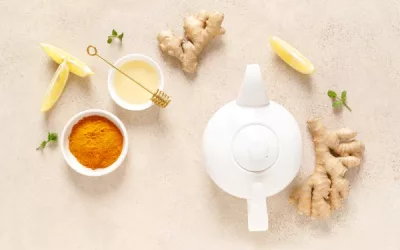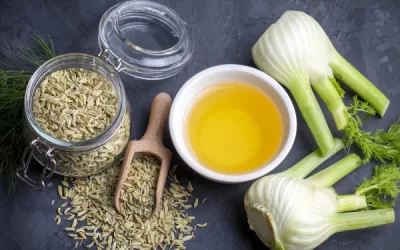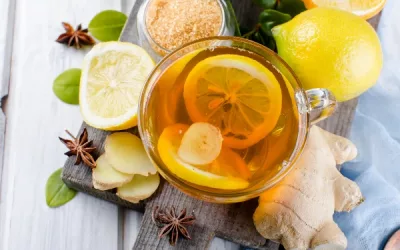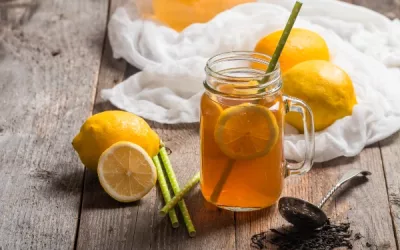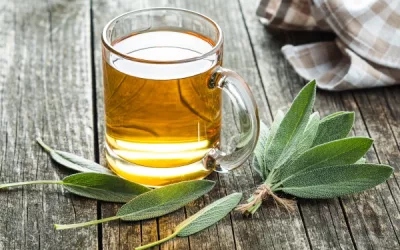Did you know that lemon balm tea has been cherished since ancient times for its calming properties? As more people seek natural remedies to manage stress, anxiety, and sleep disorders, understanding the benefits of lemon balm tea becomes ever more relevant. This ultimate guide will delve into how lemon balm tea can enhance your mood, improve cognitive function, and even aid digestion, while also addressing its preparation methods and potential risks. Get ready to explore the world of lemon balm tea and discover how it can be a soothing addition to your wellness routine.
Table of Content
What is lemon balm tea?
Lemon balm tea is a soothing herbal infusion made from the leaves of the lemon balm plant (Melissa officinalis), a member of the mint family. Known for its mild lemony scent and flavor, it has been used for centuries in traditional medicine to reduce stress, improve sleep, and enhance digestion.
Rich in antioxidants, lemon balm tea is often consumed to support overall wellness, helping to ease anxiety, tension, and indigestion. Its calming properties make it a popular choice for those seeking a natural remedy to promote relaxation and mental clarity.
In addition to its calming effects, lemon balm tea is also believed to have antiviral and antibacterial benefits. It’s often used to alleviate cold sores and other mild viral infections.
Regular consumption of this herbal tea can potentially boost mood and cognitive function, making it an excellent choice for improving concentration and reducing symptoms of mild depression.
Many enjoy lemon balm tea both for its health benefits and its pleasant, refreshing taste, making it a versatile addition to any daily wellness routine.
Lemon balm tea is a herbal beverage made from the leaves of the Melissa officinalis plant. Known for its calming effects, it aids relaxation, reduces stress, and promotes better sleep.
In ancient Greece, lemon balm was used to treat various ailments. One notable story involves the renowned Greek physician Hippocrates, often referred to as the “Father of Medicine.”
He prescribed lemon balm to his patients for its calming effects and ability to improve gastrointestinal health. The plant was highly valued for its versatility and effectiveness in promoting well-being.
I remember when I first tried lemon balm tea. I was sceptical but curious about its benefits. After a few weeks of drinking it in the evenings, I noticed I was sleeping better and felt more at ease during stressful days.
It became a comforting ritual, and now, it’s a staple in my herbal tea collection. Sharing a cup of lemon balm tea with friends has become one of my favourite ways to unwind and connect.
How to prepare lemon balm tea at home?
Preparing lemon balm tea at home is simple and rewarding. Whether you have fresh leaves from your garden or dried ones from the store, you’ll find the process straightforward. Let’s dive into the various methods you can use to brew this soothing herbal tea.
Below, you’ll see a table that outlines different preparation methods for lemon balm tea. Each row in the table represents a unique method, detailing the required ingredients and steps to follow. T
his way, you can choose the method that best suits your preference or the ingredients you have on hand.
Preparation methods for lemon balm tea
| Method | Ingredients | Steps |
|---|---|---|
| Fresh Leaves | – Fresh lemon balm leaves – Water |
1. Rinse leaves 2. Boil water 3. Place leaves in a teapot 4. Pour hot water 5. Steep for 10 min 6. Strain and serve |
| Dried Leaves | – Dried lemon balm leaves – Water |
1. Boil water 2. Add dried leaves to a teapot 3. Pour hot water 4. Steep for 5-7 min 5. Strain and enjoy |
| Lemon Balm & Mint Blend | – Fresh/dried lemon balm – Fresh/dried mint – Water |
1. Combine leaves 2. Boil water 3. Add leaves to a teapot 4. Pour hot water 5. Steep for 7-10 min 6. Strain and serve |
| Iced Lemon Balm Tea | – Fresh/dried lemon balm – Water – Ice – Lemon slices (optional) |
1. Prepare hot tea 2. Cool to room temperature 3. Fill a glass with ice 4. Pour tea over ice 5. Garnish with lemon slices |
| Lemon Balm Honey Tea | – Fresh/dried lemon balm – Water – Honey |
1. Boil water 2. Add leaves to a teapot 3. Pour hot water 4. Steep for 7-10 min 5. Strain 6. Add honey |
| Lemon Balm & Ginger Tea | – Fresh/dried lemon balm – Fresh ginger slices – Water |
1. Boil water 2. Add lemon balm and ginger to a teapot 3. Pour hot water 4. Steep for 10 min 5. Strain and enjoy |
| Lemon Balm & Chamomile Tea | – Fresh/dried lemon balm – Chamomile flowers – Water |
1. Combine lemon balm and chamomile 2. Boil water 3. Add mixture to a teapot 4. Pour hot water 5. Steep for 5-7 min 6. Strain and serve |
Health benefits of lemon balm tea
Lemon balm tea is not just a soothing beverage; it comes with a host of health benefits. This aromatic herb, with its mild lemon scent, has been used for centuries for its medicinal properties.
- Reduces Anxiety and Stress: Lemon balm has calming effects which help alleviate anxiety and stress.
- Improves Sleep: Drinking lemon balm tea before bedtime can promote better sleep.
- Aids Digestion: This tea can help ease digestive discomfort and bloating.
- Eases Menstrual Pain: It may reduce menstrual cramps and discomfort.
- Boosts Cognitive Function: Some studies suggest that lemon balm can enhance memory and concentration.
By incorporating lemon balm tea into your daily routine, you can experience these potential benefits for yourself. Remember to consult with a healthcare provider before starting any new herbal remedy, especially if you are pregnant, nursing, or taking medication.
Growing and harvesting lemon balm
Growing your own lemon balm can be a fun and rewarding experience. It is an easy-to-grow herb that thrives in various conditions, making it suitable for both garden beds and pots.
- Planting: Choose a sunny spot for planting. Lemon balm prefers well-drained soil.
- Watering: Water regularly, but avoid overwatering.
- Pruning: Regularly prune to encourage new growth and prevent the plant from becoming too woody.
- Harvesting: Harvest leaves just before flowering, when the aromatic oil content is at its peak.
Growing lemon balm at home ensures a fresh supply of leaves for your tea, enhancing the flavour and potency of each cup.
In the 16th century, lemon balm was a favourite herb of French Carmelite nuns, who used it to create a distilled water known as Carmelite Water. This concoction, believed to relieve headaches and promote calmness, became a sought-after remedy across Europe. The nuns guarded their recipe closely, adding an air of mystery to their herbal elixir.
I remember the first time I tried making lemon balm tea from fresh leaves in my garden. The aroma filled my kitchen, and the first sip was nothing short of delightful. It became a go-to remedy for stressful days, and soon, even my friends and family were hooked.
Now, our garden’s lemon balm patch is one of the most cherished parts of our home.
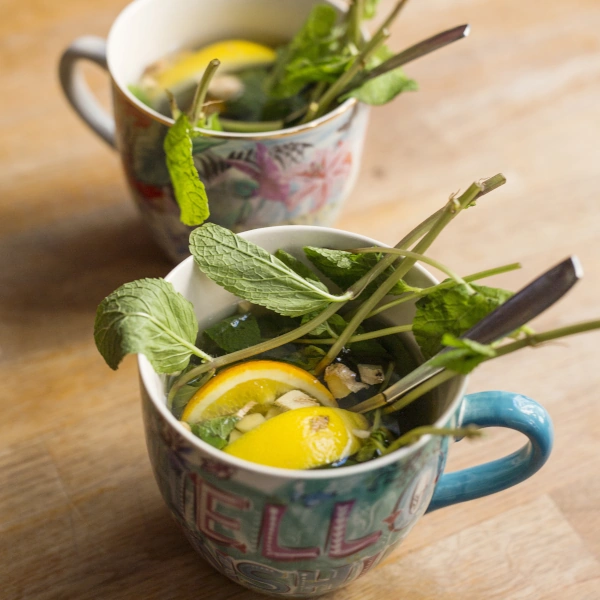
What are the potential side effects of lemon balm tea?
So, you’ve heard about lemon balm tea and its magical powers to soothe anxiety, calm nerves, and whisk you off into a blissful slumber. But let’s get real for a hot minute – like most things we put in our bodies, it’s not all sunshine and rainbows.
Lemon balm tea, while generally safe, can pack a bit of a surprise punch for certain folks. Let’s break it down so you don’t end up regretting that cuppa.
Now, don’t panic. The vast majority of people who sip on lemon balm tea don’t turn into guinea pigs for unexpected science experiments. However, no good tale started with, “This is totally safe for everyone!”
If you fall into any special categories – let’s say you’re pregnant, breastfeeding, or you’re a little toddler trying to cope with the sandbox’s drama – you might want to think twice. Lemon balm tea also plays a little too nicely with sedatives, which could leave you a bit too chilled-out for comfort.
Is lemon balm tea safe for everyone?
Okay, let’s tackle the big question first: Is lemon balm tea safe for the entire population of Earth? Well, in short, no.
- General Safety: Most people can sip away happily, but some might experience drowsiness or allergies.
- Pregnant/Breastfeeding Women: Better safe than sorry. Stick with that prenatal vitamin cocktail.
- Children: Kids are unpredictable enough; adding lemon balm tea might overdo it.
- Mixing with Sedatives: This is a no-no. Being too sedated is just as bad as not being sedated enough.
- Hypersensitivity: Some individuals might have a bad reaction purely based on their particular body chemistry.
So, while it’s generally safe, it’s not one-size-fits-all. Know your body, and if in doubt, consult a professional – you know, the ones with actual medical degrees.
Are there any withdrawal symptoms associated with lemon balm tea?
Here’s a twist for you. While lemon balm isn’t exactly the heartbreak kid when it comes to withdrawal, that doesn’t mean you can guzzle it down without a care in the world and walk away with zero consequences.
- Psychological Dependence: Some people may get so used to its calming effects that they struggle without it.
- Mild Withdrawal Symptoms: Insomnia and irritability might pop up if you abruptly stop.
- Fatigue Issues: Some people might feel extra tired when they cease consuming it.
- Increased Anxiety: Ironically, stopping it might rev up the anxiety it’s supposed to quell.
- Digestive Problems: Some users report feeling a bit blue in the tummy after saying “no more” to lemon balm.
So sure, you won’t be suffering from classic withdrawal symptoms you’d expect from some substances, but you might notice a few niggles if you quit cold turkey.
Should pregnant or breastfeeding women avoid lemon balm tea?
Let’s cut right to it. If you’re expecting a little bundle of joy or feeding one of those tiny milk vampires, lemon balm tea might not be your bestie.
- Potential Risks: There’s not enough research to fully understand its impact on foetal development.
- Milk Contamination: It could pass through breast milk, and babies don’t need any extra chill agents.
- Unknown Long-Term Effects: We don’t yet know the long-term consequences.
- Suppressed Thyroid Function: Hormone balancing during pregnancy is tricky; adding lemon balm could complicate things.
- Professional Opinions: Medical experts generally advise against it during these stages.
So, maybe leave the lemon balm in the cabinet until you’re free of pregnancy pillows and nipple cream.
Speaking of mysterious long-term effects, ever heard of Queen Victoria’s last taste of chocolate? It’s said that she had a brand new chocolatier concoct a bespoke recipe for her. But guess what?
The chocolate was so decadent and rich it knocked everyone out with food comas, making them miss a significant event. And there you have it, even royals aren’t immune to potential side effects of their indulgences.
So, be smart and think twice before sipping on that cup of lemon balm tea, especially if you’re in a special category. Cheers, and happy sipping!
What are the different types of lemon balm?
So, you’re curious about the different types of lemon balm? Excellent. It’s like having a smorgasbord of herbal delight laid out before you. Let’s break it down, shall we?
Lemon balm isn’t just one plant; it’s more like the star of its own little herbaceous party. We’ve got varieties like aurea, citronella, lemonella, lime, quedlinburger and variegated. Each one has its own distinct flair and personality, just like people in a bizarre, herb-themed soap opera. Stick with me, and let’s explore the characters of this leafy cast.
What are the characteristics of aurea lemon balm?
Aurea lemon balm, also known as golden lemon balm, is the show-off cousin in this family. It’s the one you’ll spot first at the party because, well, it’s golden. Not literally striking gold, but its leaves have this lovely, variegated golden-yellow hue that adds a pop in any garden or tea.
Characteristics:
- Colourful leaves: Bright yellow-green, making your garden look like it’s always sunnier on your side.
- Fragrant: Smells just as lemony fresh as the others.
- Grower: Perfect for containers, as it’s slightly less aggressive than others.
- Medicinal Benefits: Offers the same anti-anxiety and stress relief as its greener siblings.
- Low Maintenance: Tolerates partial shade and grows well in most soils.
If you’re the type who likes to make a statement, aurea’s your go-to. It stands out and offers all the herbal goodness without the basic green.
How does citronella lemon balm differ from others?
Citronella lemon balm is the overachiever who brings home awards like “Best at Repelling Insects”. Well, sort of. It’s somewhat similar to the citronella you’re familiar with in pest control, but let’s not confuse the two entirely.
Difference:
- Smell: Its aroma takes the lemon scent up a notch with a sharper, more citrusy punch.
- Pest Repellent: Does double duty by keeping pesky mosquitoes at bay.
- Growth: Equally enthusiastic in the garden, needs pruning to avoid your other herbs being overshadowed.
- Uses: Not just for tea, but also ideal for homemade mosquito sprays and potpourris.
- Appearance: Same green, leafy look but more straight-talking than the flashy aurea.
Citronella is practical but packs a punch. If pests annoy you while you’re savouring that evening cuppa, this one’s your buddy.
What are the unique features of lemonella lemon balm?
Lemonella lemon balm is like the creative cousin who brings exotic dishes to the family potluck. This one’s lesser-known but offers unique nuances.
Unique Features:
- Hybrid: A special cultivar bred for enhanced aroma and flavour.
- Potent Aroma: More intense lemon scent, almost like a lemon balm on steroids.
- Flavour: Best choice for those who want their tea with a strong lemon kick.
- Robust Growth: Flourishes just about anywhere but benefits from a bit of TLC.
- Versatile: Great for teas, iced drinks, salads, and even desserts.
Lemonella is the hidden gem that elevates your herbal tea game, perfect for when you want to impress your taste buds and your herb garden.
There you have it. A little flavour to suit every mood, season, and possibly pest situation in your life.
Back in the late 9th century, Charlemagne, the Holy Roman Emperor, was so taken by lemon balm’s attributes that he ordered it planted in all monastery gardens. He believed it brought mental calm and clarity—a bit like the medieval version of cool, calm, and collected.
His endorsement led to lemon balm becoming a staple of medieval medicine cabinets across Europe. All thanks to a ruler who knew a good herb when he saw one.
What precautions should be taken when consuming lemon balm tea?
So, you’re thinking about sipping on a nice cup of lemon balm tea, huh? Wonderful choice! But, like anything in life, there are some important precautions to keep in mind. Let’s dive into dosage recommendations, interactions with medications, potential allergies, long-term use effects, and the oh-so-important consultation with healthcare providers. Don’t worry, it’s not as daunting as it sounds!
Firstly, too much of a good thing can indeed be too much. Drinking too many cups of lemon balm tea might seem fine in the moment, but moderation is key. Then we’ve got medication interactions – oh, the joys of mixing herbs with pharmaceuticals!
If you’ve ever played that fun game called “Oh no, my medication doesn’t go with this herb,” then you’ll understand. Allergies? Yup, just like anything, some people might react to lemon balm. Long-term use sounds like a fairy tale involving daily tea drinking but, spoiler alert, it’s good to know if it has any long-term side effects.
Consultation with healthcare providers is kind of like the golden rule – always important for avoiding unexpected surprises.
What is the recommended dosage for lemon balm tea?
You might be wondering, “How much lemon balm tea is too much?” Well, here’s the scoop.
- The general recommendation is about 1.5 to 4.5 grams of lemon balm per day.
- That’s roughly one to three cups of tea daily.
- When in doubt, start small and see how your body reacts.
- If you’re using supplements, follow the product’s dosage instructions.
- Adding too much lemon balm could lead to some not-so-fun digestive issues.
So, starting with one cup and slowly increasing to ensure your body is happy can be a good approach. After all, you wouldn’t want your peaceful tea ritual to turn into a stomach-churning escapade.
Are there any known interactions with medications?
Ah, medications and herbal teas – a match made in cautionary tales. Lemon balm can play nice with most things, but there are a few exceptions.
- If you are on thyroid medications, be extra cautious. Lemon balm can interfere with thyroid function.
- Sedatives and lemon balm? Not a great combo. This tea can amplify the sedative effects.
- Antidepressants and lemon balm might not get along, given its calming properties.
- If you’ve got medication for glaucoma, steer clear – lemon balm might increase pressure in your eyes.
- Antiretroviral medications for HIV can also react with lemon balm, reducing their effectiveness.
In short, if you are popping pills of any kind, a chat with your doctor is in order. You don’t want a herbal tea to mess with your meds.
Should individuals with allergies avoid lemon balm tea?
Let’s talk allergies. Because nothing ruins a lovely cup of tea faster than an allergic reaction.
- If you have a known allergy to plants in the Lamiaceae family, which includes mint, basil, and sage, caution is advised.
- Watch for signs like skin rashes or itching after consuming the tea.
- Lemon balm essential oil can cause reactions, though the tea is usually milder.
- Respiratory problems after drinking the tea are a red flag (and reason to consult a doctor immediately).
- If you have food or pollen allergies, test in small doses first to ensure no cross-reactivity.
Take it slow, and if your body starts acting like it’s auditioning for a medical drama, you know it’s time to stop and consult a healthcare professional.
Speaking of professionals, always check in with a healthcare provider, especially if you’re pregnant, nursing, or managing a chronic condition.
Back in the 9th century, the wise physician Avicenna spoke highly of lemon balm, claiming it “makes the heart merry.” While Avicenna wasn’t dealing with modern medications, his recommendation for cautious use is evergreen.
Just a small dose–a cup or two to lift the spirits–may be all that you need. This insight proves valuable still today, reminding us that even age-old remedies require a balanced approach.
Conclusion
In exploring the wonders of lemon balm tea, we’ve uncovered a treasure trove of benefits that can significantly enhance our overall well-being. From improving mood and cognitive function to relieving anxiety, insomnia, and digestive discomfort, lemon balm tea serves as a gentle yet potent natural remedy for a multitude of common health issues.
The preparation methods detailed in our article add a personal touch, allowing anyone to brew a comforting cup at home, while the awareness of potential side effects reminds us to approach herbal remedies with caution, ensuring our safety and well-being.
The insights gleaned from scientific research underscore the importance of incorporating such natural solutions into our daily routines. Understanding how lemon balm tea interacts with our body not only equips us with the knowledge to make informed decisions but also highlights the broader implications of turning to nature for health solutions in a society increasingly conscious of holistic health.
For those intrigued by lemon balm tea’s benefits, consider exploring further options like combining it with other herbs to maximise its calming effects or even investigating its potential for alleviating specific conditions like IBS. Furthermore, I encourage readers to take their experiences with this herbal remedy seriously—sharing your journey can help create an invaluable resource for others seeking alternatives.
As we reflect on the potential of lemon balm tea, I’m reminded of the delicate balance between nature and wellness. Perhaps we should ponder this question: In a world saturated with fast solutions and synthetic treatments, how might we cultivate a deeper connection with natural remedies like lemon balm tea? As we sip our soothing brews, let’s not only relish in their flavours but also meditate on their power to foster healing in our lives.
Resources
- Lemon balm (Melissa officinalis L.): an evidence-based systematic review
- The effects of lemon balm (Melissa officinalis L.) on depression and anxiety in clinical trials: A systematic review and meta-analysis
- Health Benefits of Lemon Balm
- Anti-Stress Effects of Lemon Balm-Containing Foods
- Effect of a nutraceutical combination on sleep quality among people
- Research paper Are sage, rosemary and lemon balm effective
- A double-blind, randomized pilot study for comparison of
- Lemon balm tea: Types, benefits, and more


